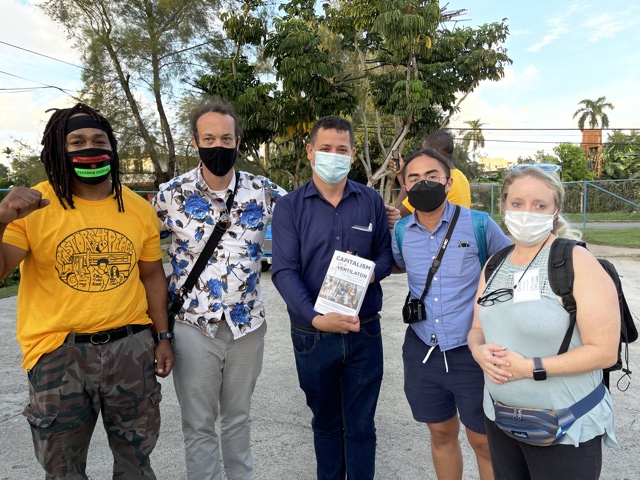U.S. caravan brings solidarity to Cuba

Ricardo Perez (center), head of International Relations for the Finlay Vaccine Institute (Instituto Finlay de Vacunas), meets with members of the Workers World Party contingent (from left to right) Chris Hollis, Peter Gilbert, Loan Tran and Elena Everett, in Havana, Nov. 16.
Gilbert was a member of the 31st IFCO/Pastors for Peace Caravan which recently traveled in Cuba.
The Pastors for Peace Caravan visited Cuba Nov. 15-26 as witness to the artificial hardships created there by the ongoing, indefensible U.S. blockade of the island. The contingent also witnessed the Cuban peoples’ resiliency and ability to face these challenges.
Members of several socialist organizations, including Workers World Party, traveled with the Caravan, along with members of Black Workers for Justice and representatives from the Southern Workers Assembly. We delivered needed medical supplies along with solidarity and witness.
U.S. tries to provoke crisis
The Caravan arrived Nov.15 — the day that a U.S.-backed counterrevolutionary movement called for protests against the Cuban government. Despite lies in the imperialist media that Cuba had “flood[ed] the streets with security forces,” the caravanistas saw no signs of police repression as we moved freely through Havana. (tinyurl.com/y854ynwn)
We witnessed one small gathering of a few dozen people in a square off the Malecon, the main roadway along Havana’s waterfront. These were identified by our taxi driver as a “protest of people who want Cuba to be more like the United States.” But there was no sign of any police there.
As Carlos Fernández de Cossio, General Director for the General Division of the United States in the Cuban Ministry of Foreign Affairs, explained to the delegation, “The U.S. bet, once the pandemic hit, that the pandemic was going to be an ally in putting greater pressure on Cuba.” This was on top of 243 increased restrictive economic measures added by the Trump administration to the ongoing U.S. blockade of Cuba.
De Cossio noted, “The current government of the U.S. got on that train,” despite Biden’s campaign promises to loosen the blockade, “and again they bet on this provoking Cuba and making this situation impossible to handle by the government, by making life difficult for the common Cuban, by depressing the standard of living, by making people desperate — that this would provoke a level of dissatisfaction that would lead to mass demonstrations, and if possible, insurrection.”
Cuba’s response to the crisis
The triple hardships of the increased U.S. coercive measures, the pandemic and the complete loss of tourism have created hardship and scarcity in Cuba not seen since the “Special Period,” following the collapse of the Soviet Union. But this has not weakened the Cuban people’s commitment to their revolutionary process.
Nowhere is this more evident than in their development of their own vaccines for COVID-19 and their ability to quickly vaccinate their entire population. Thanks to the development of these vaccines, Soberana and Abdala, more than 90% of the population, down to 2 years old, have received at least one dose of a vaccine. Over 80% have had all three doses.
This puts Cuba ninth in the world in the percentage of its population who are vaccinated, according to President Miguel Díaz-Canel, who met with the Caravan Nov. 22.
Cuba expects to be able to fully vaccinate its population by the end of November 2021. (tinyurl.com/22jnjh99)
No miracle! It’s socialist planning
The ability of Cuba to develop its own vaccine and to quickly vaccinate its population seems miraculous to someone accustomed only to capitalist health care delivery in the United States.
That a developing island nation of only 11 million people could accomplish what only large, advanced nations like the U.S. and China have done in developing a vaccine is not miraculous but a testament to socialist planning — and the foresight of Fidel Castro Ruz in encouraging the development of the state biotech industry 30 years ago.
Caravanistas met with the predominantly women researchers at the Finley Institute, where the Soberana vaccines were developed. They talked about being separated from their families and young children for a year and a half, so that they could continue the important work of collaboratively developing the vaccines without endangering their families.
They reported that there is no resistance in Cuba to being vaccinated, such as there is in the U.S., due to the complete trust Cubans have in their health care system. This trust allowed Cuba to quickly vaccinate its population — and to reopen schools, society and travel for tourism on Nov. 15, the day the Caravan arrived.
Cuba is also providing vaccines to Venezuela, Vietnam, Iran and Nicaragua, consistent with the country’s revolutionary history of medical internationalism.
Comrades in the delegation presented copies of “Capitalism on a Ventilator” to the researchers at the institute and to President Diaz Canal.
‘Capitalism on a Ventilator,’ which details the failure of capitalism during this world health crisis, is an anthology of ‘social justice activists discussing a global choice: cooperation vs. competition,’ and is available at tinyurl.com/yk95crdk.

